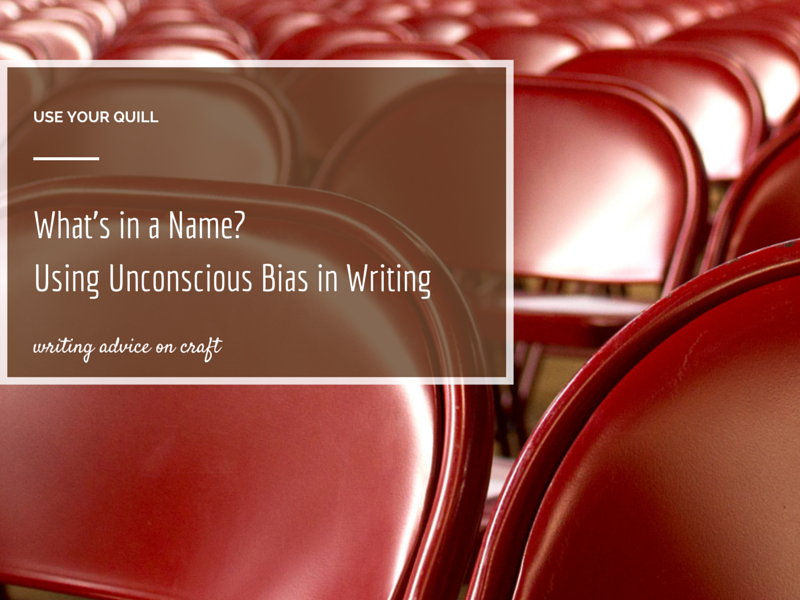Using Unconscious Bias In Writing
by Aimee Lucido
We’ve all heard about unconscious bias. We know about the study where if you feed identical resumes to a hiring panel, Harold will get the job more often than Heidi, Joe more than Jose, Shawn more than Lashawna.
These studies are always framed as revealing Bad Things about human bias. We come away from these articles promising to be more aware of our prejudices when making decisions, hiring or otherwise, because it’s unfair to Heidi, Jose, Lashawna, that they’re getting overlooked for something as stupid as their name. And this is true. We do need to be more aware of our prejudices when making hiring decisions.
But unconscious bias is a writer’s most powerful weapon.
As a writer, you put so much effort into your characters. You spend months thinking like they think, talking like they talk. You imagine them beside you as you go about your day. You think about what they would wear, eat, watch on TV after work on a Tuesday night. You slave over the paragraph in the middle of chapter two that describes what your protagonist sees when they catch a glimpse of themselves in a mirror. And yet, so many writers tack on a two-cent name to their characters in post-production, find and replace Julie with Roxy, Robert with Lennon, Michelle with Michael.
A rose by any other name might smell as sweet, but you’re not making a rose, you’re writing a book. All you have is your words and the images people associate with them. Your protagonist drinks Mountain Dew with her Doritos because it makes us think of chemicals and kids hanging out in front of the 7-11. She murmurs instead of whispers because it makes us think of groaning instead of little girls at school. And her name is Tabitha, not Jacqueline because her parents wanted her to be smart instead of glamorous.
Every word you use is an opportunity to make your reader get it. A character’s name can appear hundreds of times in a book. A wasted name is hundreds of wasted opportunities. Don’t shy away from unconscious bias just because it’s unfair to Heidi that she doesn’t get hired as often as Harold. Take the power that comes with knowledge of unconscious bias and use it to make your writing more powerful.
I could spend the remainder of this blogpost writing tips about how to find a good name for a character, but there are plenty of other articles that do that. Here is a good one by Brian Klems entitled The 7 Rules of Picking Names for Fictional Characters.
So instead, I’m going to talk about giving your characters’ names as much character as the characters themselves.
Names Are a Decision
Not every character needs to be named “Illumanata Jones (Lu for short)” but every character’s name has to be conscious. Harry Potter isn’t named Merlin Draziw (Wizard spelled backwards, duh!) but he is one of the few characters in the entire book that isn’t named something like Remus Lupin or Albus Dumbledore.
On the other hand, if every single character in your book is named Harry, Frank, Thomas, Jack, then you have a problem on your hands. All these names project the same image of a white American around the same age and time period. We have the same unconscious bias attached to all of them. The characters could scramble up their names substitute-teacher-style and no one would be the wiser.
Justify Your Names
A character can be named Peter, Edward, or Cara so long as you know why they’re named Peter, Edward, and Cara. Peter is Peter because it was his father’s name, and his father before him. Edward is Edward because it’s old-timey, and Edward has been a teenager for hundreds of years. Cara is Cara because it means “face” in Italian, and Cara is pretty. Plus her middle name is Mia, so we know her parents had a sense of humor.
Not every name needs to reveal a back story either. You can justify a name because you knew somebody with that name back in grade school and the character is based off of them. For example, if your character is into comics just like your friend Eric, maybe name your character Eric. You’ll picture your grade-school friend every time you write his name and your character will have more depth.
You could even do something simple, like name your character Brad because every Hot Guy in media is named Brad and that’s all you want your character to be. Or you can name your character Jackie because Jackie makes you think of edges, and Jackie is bony. It doesn’t matter what the justification is, as long as you know what it is.
My Favorite Character Ever Named
Josephine March from Little Women is among my favorite named characters. It’s not so much her given name that matters to me, it’s what she does with it.
The name Josephine elicits Victorian America, which is when and where she lived, so we’re on track so far. But here’s what’s cool about Josephine March.
She lived in a time when women rarely took ownership of themselves. Women were seen as pretty things to look at, passed down from father to husband, with little agency of their own. While Amy, Beth, and Meg more or less recognize this as their cross to bear, Josephine marches (no pun intended) to the beat of her own drum.
So, Josephine takes ownership of her name, calls herself the masculine Jo instead of the feminine Josephine, and as a result defines herself in the eyes of her friends, family, and ultimately the reader.
This is what you want to evoke from your readers: a voice, a point of view, a picture. Make your character’s name a decision, not an accident, and the rest of the character will unfold from that.
So when you find yourself scrambling for a name, going to babynames.com and ultimately picking one out of a hat, then maybe your character isn’t ready yet. Put them back in the oven until they tell you what their name is. Then they’re a fully formed character.






0 Comments